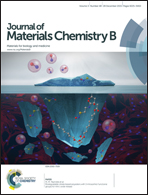A solution processed carbon nanotube modified conducting paper sensor for cancer detection†
Abstract
A solution processed poly(3,4-ethylenedioxythiophene):poly(styrenesulfonate) (PEDOT:PSS)–carbon nanotube (CNT) nano-composite has been utilized for the fabrication of a conducting paper (CP) via dip coating. Further, high conductivity of this paper (from ∼6.5 × 10−4 to 2.2 × 10−2 S cm−1) obtained by treating it with formic acid (CNT/FA@CP) is due to the removal of the non-conducting PSS molecules from its surface. This smart conducting platform has been used for the conjugation of the anti-carcinoembronic antigen (CEA) protein for quantitative estimation of CEA, a cancer biomarker. Transmission electron microscopy (TEM), Raman spectroscopy, X-ray diffraction (XRD), scanning electron microscopy (SEM), X-ray photoelectron spectroscopy (XPS), electrochemical impedance spectroscopy (EIS) and amperometric techniques have been used to characterize the low cost, flexible and environmentally friendly conducting BSA/anti-CEA/CNT/FA@CP) paper electrode that is found to be highly sensitive (7.8 μA ng−1 ml cm−2) in the physiological range (2–15 ng ml−1) of CEA. The response of the paper electrode is validated using CEA concentration of serum samples of cancer patients obtained via the immunoassay technique.


 Please wait while we load your content...
Please wait while we load your content...